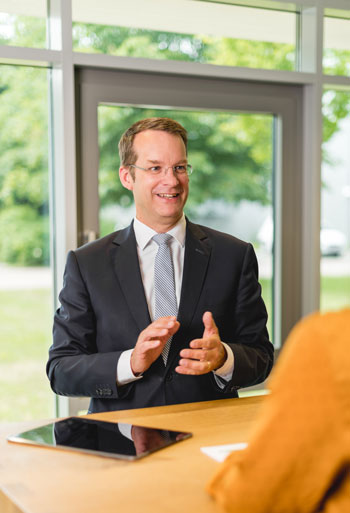We spoke to Professor Christian Hopmann, Institute Director of the IKV, about the topics of the symposium, the cooperation with the PPS - Polymer Processing Society and why it is so important to hold the Symposium as a face-to-face event.
The symposium will be held for the first time in cooperation with the PPS in 2022. What is the significance of a joint event for the IKV - and also for the PPS?
Chr. Hopmann: The PPS is the worldwide network of science in plastics technology, in which I myself am active as an International Representative based in Germany. Interaction in global networks is of great importance today, not only for business but also for science. Large international events such as our symposium offer participants the opportunity to learn about topics and findings from researchers worldwide. For the IKV, the cooperation opens up even better access to the international science scene; an added value that directly benefits the participants of our symposium - speakers and visitors alike. For the PPS, the opportunity arises to develop closer contacts with the plastics industry and to discuss research topics directly with practical industrial users.
The programme is determined by contributions selected by an international committee. Which topics do you allow for presentation?
Chr. Hopmann: The main topics focus on the research fields of additive manufacturing, circular economy/recycling, compounding/extrusion/rheology, injection moulding, lightweight construction technologies and plastics industry 4.0/digitalisation. Beyond that, however, we are open-minded and will of course also examine contributions that focus on other research aspects from plastics technology.
One of the main topics is circular economy. What innovations do you expect for plastics processing here?
Chr. Hopmann: It is about making progress in all fields, i.e. materials from renewable raw material sources, design for recycling, resource-efficient processes and better - mechanical as well as chemical - recycling.
The solution will not come from some kind of big bang, but will be brought about by a systematic and continuous improvement of the CO2 and life cycle assessments of plastics applications and manufacturing processes. To achieve this, there will undoubtedly be regulatory developments; which applications and processes developed in this course will then prevail will be decided by the market. All available knowledge on the pressing issues must be included in the development of solutions, so the involvement of science at all relevant points in the value chain is invaluable. I am sure that we will see a number of interesting approaches to this, especially from young scientists. For this reason alone, it is worth attending the symposium.
How do the circular economy and digitalisation megatrends actually fit together?
Chr. Hopmann: It's pretty clear: without digitalisation, there is no circular economy. When we tried, to put it exaggeratedly, to track Covid 19 infections with paper and fax, we failed miserably. Countries with high penetration of digital technologies, on the other hand, had a lot of data with which they could reliably observe and evaluate what was happening at any given time. The same applies for the circular economy: only if we succeed in digitally recording the material flow, whether it is plastic or CO2, will we have a chance to close the loop also in material terms. Anything else will not work.
What importance do you attach to face-to-face events in the research context? Or do you have the impression that in the past two years, due to the pandemic situation, there has been a reduced exchange in science, especially in plastics technology?
Chr. Hopmann: Much worse: there has been no sufficient exchange between science and industry. The point is that the initial enthusiasm that long journeys could be replaced with little effort by video conferences was followed by a certain disillusionment, despite the excellent technical possibilities. We have learned that many rather functional encounters can be reproduced very well via digital media. But creative work, chance encounters, inspiring conversations that always appeal to the emotions still require the whole person. These are precisely the conversations that are of outstanding importance in the engagement with science. In this respect, there is a great need for personal encounters and a high degree of anticipation for such events. Both objective and subjective reasons clearly speak for this kind of encounter.
Last year, the symposium took place digitally. To what extent do you think the live format will influence the character and impact of the event?
Chr. Hopmann: In 2020, we were still not very experienced in the use of such systems for events with almost 100 participants. Nevertheless, the event went extremely well from a technical point of view. There were also excellent presentations and very good discussions. However, there were no break times or evening discussions, no informal meetings and hardly any space to let one's thoughts wander. This means that we dealt very well with the topics presented, but no new ones were added. Here I expect that the presence will compensate for this enormous disadvantage. There will be room for conversations in small and changing groups, which will make a significant difference.
To whom do you recommend participation in the International Colloquium on Plastics Technology?
Chr. Hopmann: Anyone in plastics technology who is curious and interested in international networking.
What happens if travelling is still difficult in March due to the pandemic?
Chr. Hopmann: I am an optimist in my first profession and in this respect I assume that there will be no insurmountable hurdles. In any case, we are 100% committed to a live event and with the help of appropriate measures we will do everything to make it possible.

